By Paul Rozycki
Guess what? There was cheating in the 2020 election.
And guess what? There was so little of it, in a nation of 330 million, that it scarcely mattered.
And from what we know, there were both Republicans and Democrats doing it.
According to a Washington Post survey, there were 16 cases of cheating last year—about one for every 10 million votes cast. Even the Republican leaning Heritage Foundation claimed to have found a little more than 1200 cases in the last 40 years. Many other studies found similar results. Most of those cases were attempts to vote for someone else, and they were quickly caught.
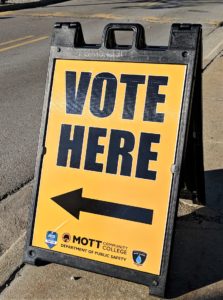
(Photo by Paul Rozycki)
There was the story of one man in Pennsylvania who asked if he could vote for his son. The poll workers turned him down. He returned an hour later, in sunglasses, claiming to be his son, and tried to vote. The workers saw through the scheme, and he now faces felony charges. But that was one man, not a thousand, and not a million.
Perhaps the most bizarre case was the case of a Colorado man who got caught voting for Trump twice, once for himself, and once for his dead wife. There was one small problem. He was also accused of murdering his wife, but he wanted to give Trump an extra vote. Do you suppose he voted for him because he was the “law and order” candidate?
No serious evidence of wide-spread vote fraud
Yes, there were a few people who tried to cheat and vote more than once, vote in a second state, or for another person. But there were very few. After more than 60 court cases in front of both Republican and Democratic judges, essentially all of the charges of massive fraud have been dismissed.
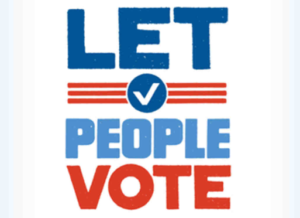
(Photo source ACLU)
Recently a Michigan judge dismissed a final lawsuit claiming there was fraud in Antrim County. There is no serious evidence that thousands of ballots were dumped in a river, voted by dead people or illegal aliens, flown in from China, or shifted from Trump to Biden by some foreign computer program.
The challenges of the 2020 election
To be sure the 2020 election was a challenging one, where election workers in thousands of local communities were expected to adjust to last-minute demands for social distancing, revised deadlines, and an increase in absentee/mail-in voting because of the COVID pandemic.
For the most part they did a remarkable job dealing with all the changes as the nation turned out in record numbers to cast their ballots. Yes, there were mistakes, but they were usually corrected quickly as the ballots were tallied. The remarkable thing is that with all the last-minute changes, local officials managed well.
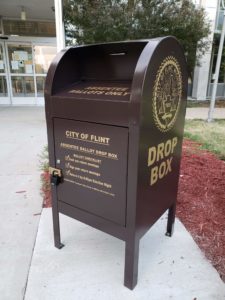
Absentee Ballot Drop Box outside City Hall. (Photo by Tom Travis)
Donald Trump learned that when he tried to register in Florida using his 1600 Pennsylvania Ave. White House address. The local election board caught the error, and he entered his Mar-a-Lago voting address. After all the checking and double-checking, the 2020 election may have been the most honest in our history.
Yet the idea that this was a stolen election was the motivation for the Jan. 6 insurrection at the U.S. Capitol, and has led many Republicans to argue that Biden is not the legitimate president. Even after the riots at the Capitol, 147 Republicans voted to not certify the election for Biden. In recent months that has led to a move to limit voting rights in nearly all the states.
The move to limit voting rights
Under the guise of preventing election fraud, 47 states have begun to revise their election laws, introducing 361 bills that would make it more difficult to vote. At the end of March the Michigan legislature introduced a package of 39 bills, many of which would limit access to voting. Though the details vary from state to state, most of these attempts to limit the vote have several things on common:
- Most would limit or make absentee voting more difficult.
- Many would make early voting more difficult.
- Many would require stricter voter ID laws.
- Some would limit Sunday voting, with major impact on minority voters.
- Many would limit the time to register to vote or request an absentee ballot.
- Most would make it easier to purge voter rolls, with the risk that legitimate voters would be eliminated.
- Some would limit voter registration drives.
- Some would prevent state and local officials from sending out voting applications.
- Many would limit or eliminate drop boxes for absentee voters.
- Many would make it more difficult for students to register and vote on their campus.
- Some of them would limit the power of local officials to conduct their elections.
- One state would prohibit giving food or drink to those waiting to vote.
To be sure, there is a need to review our election processes in light of the pandemic, and the increase in absentee or mail-in voting. Certainly voting rolls should be kept up to date, procedures could be improved, and the actions taken in response to the pandemic need to be formalized. And some of those reasonable ideas are tucked into the tsunami of bills, as a sweetener, in many state legislatures.
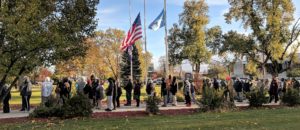
Voters standing in line outside Flint City Hall during the November 2020 election. (Photo by Paul Rozycki)
But the overall intent is clear. These bills are being pushed by Republican lawmakers because a dramatic increase in voter turnout in 2020 gave Biden a 7 million vote victory. The goal of these bills is to reduce that record turnout by making it more difficult to register and vote. Some see the laws as a return to the Jim Crow era of decades past.
The attempts to expand voting rights
Yet, in response to these actions that would restrict the right to vote, there are signs that those who oppose the restrictions are pushing back. More than 40 states have introduced measures that would expand the right to vote, make registration easier, allow for more absentee voting, and restore the right to vote for those with past convictions.
Similarly, the U.S. House is considering a bill that would protect voting rights on the federal level.
Unintended consequences
Finally, there may be unintended consequences in the attempts to limit the vote.
While Democrats did well in 2020 with a wider use of the absentee/mail-in ballot, at least for the presidential election, it’s not certain that will hold true for the future. Historically absentee voters have tended to be older, and more Republican, and there’s no guarantee that without Trump to run against, that the Democrats will retain their advantage. It’s possible that in the future, the proposed limits will deter as many Republican voters as Democrats.
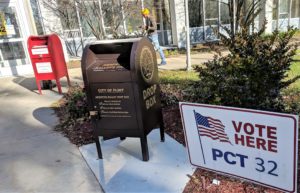
Absentee ballot drop box outside City Hall. (Photo by Paul Rozycki)
Sometimes the attempt to limit a right may cause people to become more energetic in exercising that right. A few years ago North Carolina took action to limit voting, particularly for Black voters. According to some reports, the response was a significant increase in Black voter turnout. The attempt to limit the vote caused even marginal voters to get energized and go to the polls. Sometimes nothing motivates people more than telling them they can’t do something.
The impact on democracy and the election system
The attempts to limit voting are clearly aimed at giving Republicans an advantage over Democrats in future elections. But the real impact goes far beyond giving one party a political benefit. The right to vote is the most basic aspect of democracy. By limiting that right these bills undermine the trust we have in the most basic of our democratic institutions—our election process.

Voters lined up outside City Hall during the November 2020 election. (Photo by Paul Rozycki)
The impact could be more critical, and last longer, than either a Republican or Democratic victory. Responding to both voter restrictions and gerrymandering, former Attorney General Eric Holder expressed the views of many when he said “I am really worried that our democracy will be fundamentally and irreparably harmed.
“We will still have elections every two years or every four years but they could be rendered close to meaningless,” Holder said.
It’s up to us to pay attention and make sure that doesn’t happen. It’s about more than just the next election. And it’s about more than just Democrats and Republicans. It’s about the most essential element of democracy…the right of everyone to vote.
EVM political commentator Paul Rozycki can be reached at paul.rozycki@mcc.edu.

Rozycki (Photo by Nancy Rozycki)



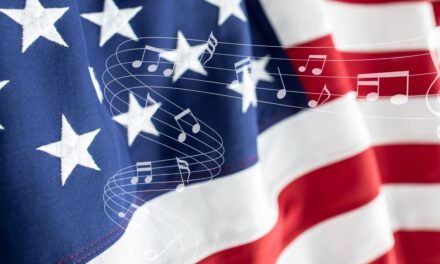




You must be logged in to post a comment.